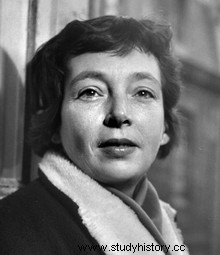Marguerite Germaine Marie Donnadieu, known as Marguerite Duras (1914 – 1996) was a French woman of letters and director, an important author of the 20th century.
Indochinese childhood
 Third child of Marie Donnadieu, teacher, of Henri Donnadieu, school principal, Marguerite Germaine Marie Donnadieu was born on April 4, 1914 near Saigon (which at the time belonged to French Indochina). Her father died of illness in 1921, when Marguerite was only seven years old, and her family returned to live for two years in metropolitan France, in a small village in the south-west of France.
Third child of Marie Donnadieu, teacher, of Henri Donnadieu, school principal, Marguerite Germaine Marie Donnadieu was born on April 4, 1914 near Saigon (which at the time belonged to French Indochina). Her father died of illness in 1921, when Marguerite was only seven years old, and her family returned to live for two years in metropolitan France, in a small village in the south-west of France.
From 1924, Marie Donnadieu was sent successively to Phnom-Penh, to Vin Long, to Sadec, then to Saigon. Wishing to settle somewhere, she bought land in the Mekong Delta in 1928. But her land, constantly flooded, is impossible to cultivate and Marie, ruined, is forced to resume teaching. This unfortunate experience left a lasting mark on the young Marguerite.
The French Empire
Marguerite studied in Indochina until 1931, when she was sent to France to a private school. She enrolled in law school in Paris and then studied political science. In 1938, after graduating, she was hired as a secretary at the Ministry of the Colonies. In September 1939, she married Robert Antelme, mobilized when the war started.
In 1940, Marguerite co-signed, under the name of Marguerite Donnadieu, a first book:The French Empire , a work of colonialist propaganda quoting in particular Jules Ferry in these terms:it is the duty "of the superior races to civilize the inferior races". Later, she will disavow this book. In November of the same year, she resigned from her post.
The group from rue Saint-Benoît
Marguerite and Robert spend the war in occupied Paris. Pregnant, Marguerite gives birth to a stillborn child whose loss affects her deeply. In 1942, she became general secretary of the Book Organizing Committee. She started writing herself and published her first novel, Les Impudents , then using as a pen name the village of the paternal house:Duras.
During the war, a small group of intellectuals, including Edgar Morin and Henri Michaux, began to meet at Marguerite's to discuss politics and literature, forming the rue Saint-Benoît group . Several of them are linked to the Resistance and Marguerite and Robert are linked to the RNPG, a network providing false papers to escaped prisoners, led by François Mitterrand. In June 1944, Robert was arrested by the Gestapo and deported to Dachau, while Marguerite managed to escape. Her husband was found in Dachau in April 1945, half dead, and she spent a year caring for him.
The war, the Resistance and the liberation inspired Marguerite to write many works:the novel L’Amant, le film Hiroshima my love or the Cahiers de la Guerre , written in 1944 and later used as content for his book La Douleur .
Marguerite the activist
Marguerite Duras and Robert divorced in April 1947 and she remarried her lover Dyonys Mascolo, with whom she had a son, Jean. For a time, Marguerite was an activist in the Communist Party, but rumors about her morals, in particular her frequenting of nightclubs, multiplied and she ended up being expelled from the Party. Despite everything, she claims to be a communist and campaigns for various causes, including abortion. In 1960, she signed the Manifesto of 121 against the war in Algeria. In 1971, she also signed the Manifesto of 343 for the right to abortion.
Theatre and cinema
In 1958, the filmmaker René Clément adapted his autobiographical novel, the Barrage contre le Pacifique, into a film. The same year, Marguerite Duras wrote the screenplay for Hiroshima mon amour and that of Such a long absence . She also branched out into acting, adapting previously written short stories and finding success in 1965 with Full Days in the Trees . Subsequently, wishing to adapt her works to the cinema herself, she embarked on directing with La Musica in 1966 then Destroy, she says in 1969. She produced many experimental works, with static shots and even completely black images in Atlantic Man .
Addiction
For many years, Marguerite Duras has had problems with alcoholism and alternates periods of abstinence and periods of consumption. In 1982, she went to rehab, but returned to alcohol a few years later. She will evoke this dependence, which makes writing physically difficult for her, in her book Material Life .
In 1984, his novel The Lover obtains the Goncourt prize and Marguerite becomes world famous. The following year, however, a column she wrote for Liberation on the affair of little Grégory, in which she was convinced of the mother's guilt, aroused controversy and hostility.
Marguerite Duras died on March 3, 1996 in Paris. All of his works have sold more than five million copies, and some of his books have been translated into more than 35 languages.
